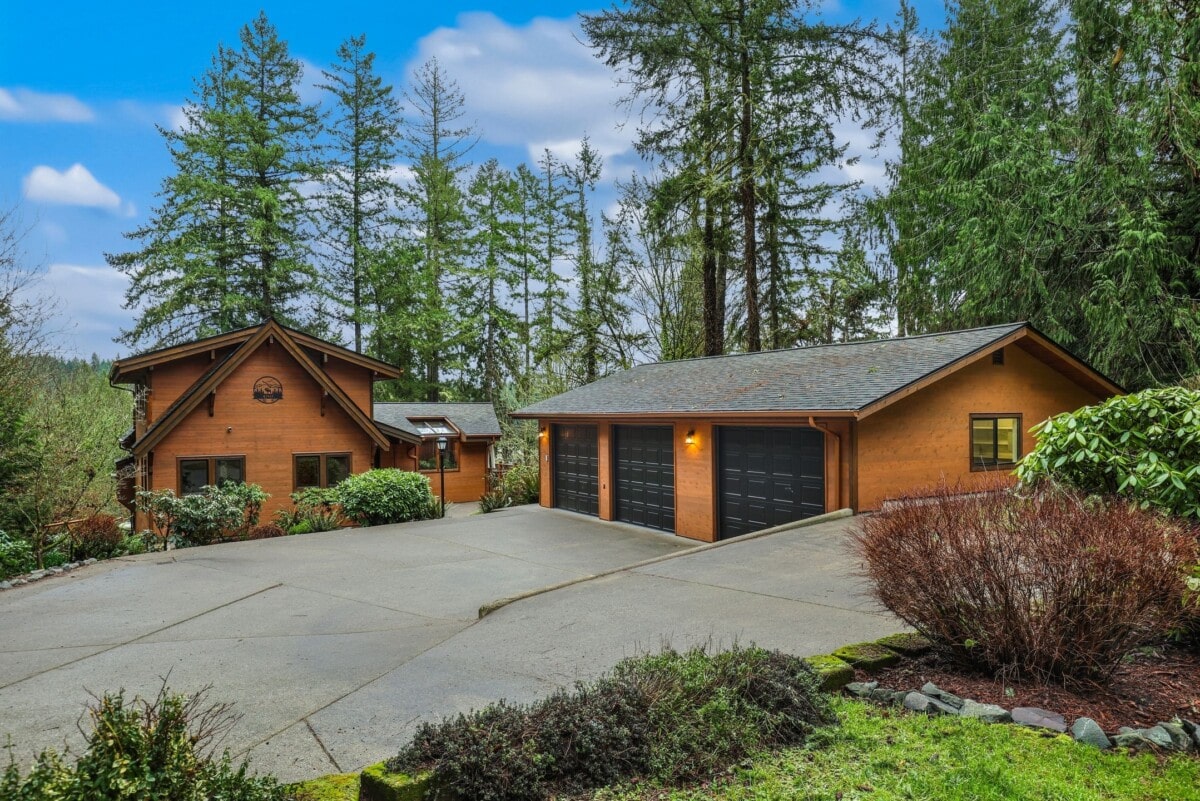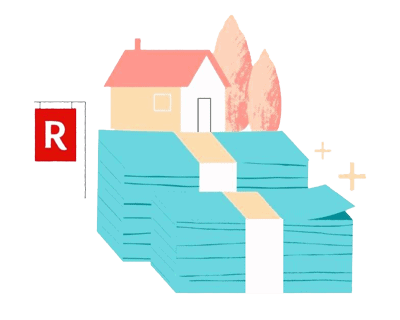Choosing the right home loan is a crucial step in your homebuying journey. With various mortgage types available, navigating the options can be overwhelming.
Whether you’re looking to buy your first home in Austin or refinance your house in Miami, understanding the different mortgage types and key factors is essential. This Redfin guide will help you make sense of your options and ensure you find a mortgage that fits your needs and budget, making your path to homeownership as smooth and informed as possible.

What is a mortgage? Understanding mortgage basics
A mortgage is a loan taken out to purchase a home, where the property itself serves as collateral. As a borrower, you’re entering a legal contract to repay your loan, with interest, over a set amount of time. Your monthly mortgage payment generally consists of four components:
- Principal: The amount of money you borrow to buy the home.
- Interest: The cost of borrowing the money, calculated as a percentage of the principal.
- Taxes: Property taxes levied by the local government.
- Insurance: Homeowner’s insurance and, if applicable, private mortgage insurance (PMI).
When comparing mortgage loans, focus on the annual percentage rate (APR), which represents the total cost of a loan, including both the interest rate and other loan fees. Understanding these components can help you make informed decisions about your mortgage options and manage your finances effectively.
6 main types of mortgages
Understanding the different types of mortgages can help you decide the one that best fits your needs and financial situation. Here’s an overview of the main mortgage types:
1. Conventional mortgages
Conventional mortgages are loans not backed by the federal government. To qualify, borrowers generally need good credit, stable employment, and a down payment. These loans often come with lower interest rates and do not require private mortgage insurance (PMI) if you can provide a down payment of at least 20%. Conventional mortgages are versatile and suitable for primary residences, second homes, and investment properties.
2. Conforming mortgage loans
Conforming mortgage loans adhere to the guidelines set by Fannie Mae and Freddie Mac. These loans are bound by maximum loan limits that vary by geographic area, but are generally lower than non-conforming loans. Because they meet federal guidelines, conforming loans typically offer lower interest rates due to reduced lender risk and are easier to qualify for compared to non-conforming loans.
3. Jumbo loans / non-conforming loans
Non-conforming mortgage loans, commonly known as jumbo loans, exceed the loan limits set for conforming mortgages. These loans are designed for higher-value properties and come with stricter requirements, including strong credit, larger cash reserves, and higher down payments. While they allow for higher loan amounts, jumbo loans typically have higher interest rates due to the increased risk for lenders.
4. FHA-insured loans
FHA-insured loans are backed by the Federal Housing Administration and are aimed at helping low- to moderate-income borrowers who might not qualify for conventional loans. These loans have more relaxed credit score requirements and lower down payment options, with down payments as low as 3.5% for borrowers with credit scores of 580 or higher. However, FHA loans require both an upfront mortgage insurance premium (MIP) and monthly MIP payments, which can increase the overall cost of the loan.
5. VA-insured loans
VA-insured loans are backed by the U.S. Department of Veterans Affairs and are available to qualified veterans, active-duty service members, and their spouses. These loans offer significant advantages, including no down payment, no PMI, and competitive interest rates. Additionally, VA loans have limited closing costs and no prepayment penalties. A funding fee may apply, but this fee can be waived for eligible veterans, such as those with service-related disabilities.
6. USDA-insured loans
USDA-insured loans are guaranteed by the U.S. Department of Agriculture and are designed to promote homeownership in rural areas. These loans require no down payment and offer low mortgage insurance premiums, making them an attractive option for low- to moderate-income buyers. To qualify, the property must be located in a designated rural area, and borrowers must meet income limits that vary by region and household size.

Key considerations when choosing a mortgage
Your financial health
- Credit score: Your credit score significantly impacts your ability to qualify for a mortgage and the interest rate you’ll receive. Higher credit scores typically secure lower interest rates, resulting in lower monthly payments and less paid over the life of the loan.
- Income stability: Lenders prefer borrowers with a stable income and employment history. Documenting at least two years of consistent income can be crucial.
- Debt-to-income ratio (DTI): This ratio compares your monthly debt payments to your monthly gross income. A lower DTI indicates better financial health and increases your chances of loan approval. Generally, a DTI below 36% is considered favorable.
Down payment
The size of your down payment affects your mortgage terms in several ways. A larger down payment reduces your monthly payment by lowering the amount you need to borrow. Additionally, it can eliminate the need for private mortgage insurance (PMI), which is typically required if your down payment is less than 20%.
A substantial down payment also demonstrates financial stability to mortgage lenders, which can result in more favorable loan terms, such as lower interest rates.
However, if a larger down payment isn’t feasible, many loan programs offer the flexibility of lower down payment options, which can make homeownership more accessible. While a down payment of less than 20% might require PMI, these options allow you to get into a home sooner without the need to save a significant amount upfront. This can be especially helpful for first-time homebuyers or those looking to keep more cash on hand for other expenses.
Loan term
The loan term is the length of time you have to repay the loan, and it plays a critical role in determining your monthly payments and the total cost of the loan. Common terms are 15, 20, and 30 years, though some lenders may offer other options such as 10, 25, or even 40-year terms.
- 15-year term: A 15-year mortgage term typically comes with higher monthly payments but significantly lower interest costs over the life of the loan. This is because you pay off the loan more quickly and reduce the total interest paid. This option is ideal for borrowers who want to build equity faster and can afford the higher payments.
- 20-year term: A 20-year mortgage is a middle ground between 15 and 30 years. It offers a balance of manageable monthly payments and reduced total interest costs compared to a 30-year loan. This term can be a good compromise for those seeking a shorter payoff period without the higher payments of a 15-year loan.
- 30-year term: A 30-year mortgage term is the most popular choice among homebuyers due to its lower monthly payments, which make homeownership more affordable. However, the trade-off is higher total interest costs over the life of the loan. This term is suitable for borrowers who prefer lower monthly payments and plan to stay in their home for a long period.
- Other terms: Some lenders offer unconventional terms like 10, 25, or even 40 years. A 10-year loan has the highest monthly payments but the least amount of interest paid. A 25-year term offers a slight reduction in monthly payments compared to a 20-year term, while a 40-year term has the lowest monthly payments but the highest total interest cost.
Interest rates
Interest rates are a crucial factor in determining your mortgage payments and overall loan costs. They can significantly impact the affordability of your loan and the total amount you will pay over the loan term. There are two primary types of mortgage interest rates to consider:
- Fixed-rate mortgages (FRMs): The interest rate remains constant for the life of the loan, providing predictable monthly payments.
- Adjustable-rate mortgages (ARMs): The interest rate is fixed for an initial period (e.g., 5, 7, or 10 years) and then adjusts periodically based on market conditions. ARMs typically start with lower rates but can increase significantly after the initial period.
When choosing between fixed-rate and adjustable-rate mortgages, consider your long-term plans, financial stability, and risk tolerance. Fixed-rate mortgages offer predictability and peace of mind, while adjustable-rate mortgages provide lower initial payments but come with the risk of future rate increases. Evaluate your situation carefully to determine which type of interest rate aligns best with your financial goals.
What to do once you’ve decided on the right mortgage
Now that you’ve chosen the best mortgage type for your needs, it’s time to take the final steps toward securing your home loan. First, get pre-approved, which will give you a clear picture of your budget and strengthen your position as a buyer. Then, work closely with your lender to gather the necessary documentation and complete the application process. Remember to review the terms carefully and ask any questions you may have before finalizing your loan. With the right mortgage in place, you’ll be well on your way to making your dream of homeownership a reality.

What mortgage is right for me FAQs
What is the difference between a fixed-rate and an adjustable-rate mortgage?
A fixed-rate mortgage has a constant interest rate for the life of the loan, providing stable and predictable monthly payments. An adjustable-rate mortgage (ARM) has an initial fixed-rate period followed by periodic rate adjustments based on market conditions, which can result in fluctuating monthly payments.
How much should I save for a down payment?
The amount you should save for a down payment depends on several factors, including the type of mortgage you choose, the price of the home, and your financial situation. While the traditional benchmark is 20% of the home’s purchase price, many loan programs allow for lower down payments, ranging from 3% to 10%. Saving more can reduce your monthly payments and potentially eliminate the need for private mortgage insurance (PMI). However, if saving 20% is challenging, don’t be discouraged—explore options that fit your budget and financial goals..
Can I qualify for a mortgage with bad credit?
Yes, some loan programs, such as FHA loans, are designed for borrowers with lower or bad credit scores. However, having a higher credit score can help you secure better interest rates and loan terms.
What is PMI, and do I need to pay it?
Private mortgage insurance (PMI) is a type of insurance that protects the lender if you default on your loan. It is typically required if your down payment is less than 20%. Some loan programs, like VA loans, do not require PMI.
What are the benefits of getting pre-approved for a mortgage?
Getting pre-approved helps you understand how much you can afford, makes you a more attractive buyer to sellers, and allows you to act quickly when you find a home you want to purchase. It also provides a clearer picture of the loan terms and interest rates you qualify for.
What should I consider when choosing a mortgage lender?
When selecting a mortgage lender, consider factors such as interest rates, loan terms, fees, customer service, and the lender’s reputation. Comparing offers from multiple lenders can help you find the best deal for your financial situation.
What are closing costs, and how much should I expect to pay?
Closing costs are fees associated with finalizing your mortgage, including appraisal fees, title insurance, and attorney fees. These costs usually range from 2% to 5% of the loan amount. Some loan programs may offer assistance with closing costs for first-time buyers.
How can I avoid mortgage lending discrimination?
Mortgage lending discrimination is illegal. If you believe you’ve been discriminated against, you can file a complaint with the Consumer Financial Protection Bureau (CFPB) or the U.S. Department of Housing and Urban Development (HUD). Always ensure you understand your rights and seek legal advice if necessary.


















